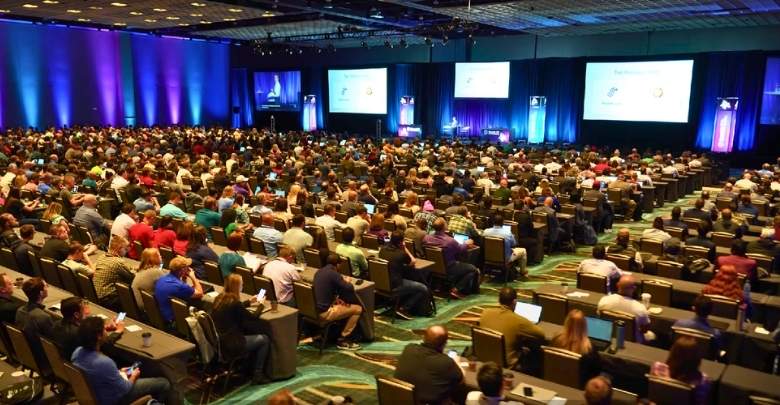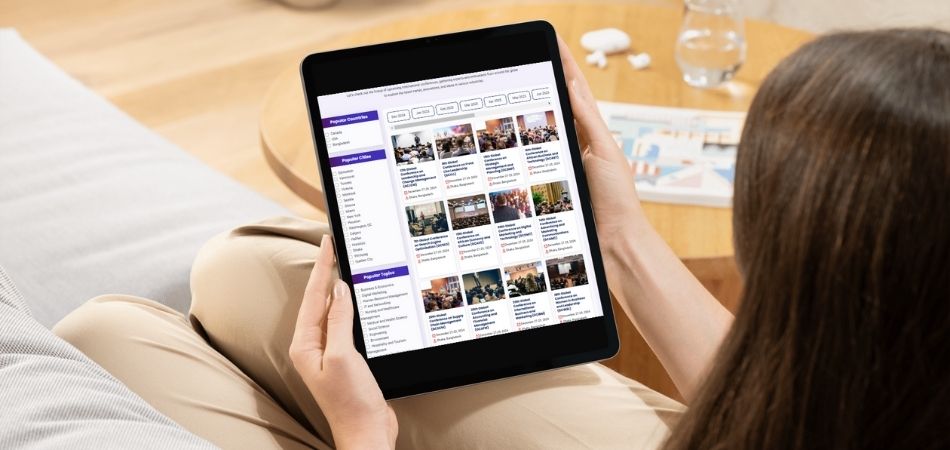A quality conference can make a huge difference in your professional life. It offers opportunities to learn from experts, network with peers, and stay updated on industry trends. A good conference is more than an event; it’s a catalyst for growth and inspiration. But how do you get a conference to attend?
You can start by identifying your interests and searching for relevant events platforms such as Global Conference Alliance. Review the details carefully, register early, and prepare the necessary documents, especially for international travel. Seek funding if needed, plan your trip thoughtfully, and begin networking beforehand.
Don’t forget to bring business cards and follow up with new contacts afterward. Would you like to learn more? Keep reading to explore each step in detail and make the most of your conference experience.
Why Should You Take Part in a Conference?
Participating in conferences helps you learn from experts in your field, which can improve your knowledge. You can hear about new trends and ideas that are shaping your industry. Conferences also provide a way to discover unique insights that can inspire creativity. These events spark new and valuable discussions.

Networking at conferences connects you with people who share your interests, opening doors for future collaborations. You can meet like-minded peers, experienced mentors, or potential business partners. These connections often lead to lasting relationships, which benefit both personal and professional growth. Sharing ideas with others encourages different perspectives and fresh solutions.
Conferences also allow you to showcase your work and gain feedback from diverse audiences. Presenting your ideas can enhance your reputation and visibility in your field. For a broader perspective, engaging with upcoming conferences in Canada can offer unique opportunities to explore relevant industries. These events provide platforms to display your innovations or unique contributions.
Learning happens beyond sessions, through casual talks or group activities that build informal bonds with others. Conferences often expose you to new tools, techniques, or resources that may enhance your work. Engaging in discussions broadens your view and challenges your thinking. You gain motivation and a better understanding of future industry directions.
How Do You Get a Conference to Attend?
Taking part in a conference can open doors to new opportunities, knowledge, and connections in your professional life. But figuring out how to find and attend the right one might seem overwhelming. Don’t worry—we’ve got a step-by-step guide to help you navigate the process smoothly.
Step 1: Identify Your Interests
Begin by reflecting on the topics or fields that genuinely excite you. Think about areas where you want to expand your knowledge or skills. This self-assessment will help you focus on conferences that align with your professional goals. Knowing your interests ensures you’ll find events that are both engaging and valuable.
Step 2: Search for Conferences
Once you’ve pinpointed your interests, start searching for relevant conferences. For example, if you’re interested in academic advancements, you might look for a research conference focusing on your field. Use online platforms like Global Conference Alliance or check out professional organizations in your area of expertise. These resources often have detailed lists of upcoming events, which will help you in choosing the right research conference to make sure you find one that aligns with your goals and interests.
Step 3: Check Conference Details
After compiling a list of potential conferences, dive into the specifics of each one. Look at the dates, locations, agendas, speakers, and registration fees. Make sure the conference content aligns with what you’re looking to learn or achieve. Also, ensure the timing and location fit your schedule and travel abilities.
Step 4: Register Early
When you’ve decided on a conference, it’s best to register as early as possible. Early registration can often save you money through discounted fees. It also guarantees your spot before the event sells out. Following the registration instructions carefully will help avoid any hiccups.
Step 5: Prepare Your Documents
If the conference is international, check that your passport is valid and determine if you need a visa. Gather all necessary documents like proof of registration or invitation letters. Taking care of these details well in advance prevents last-minute stress. Being prepared ensures a smoother journey.
Step 6: Seek Funding or Grants
Attending conferences can be expensive, so it’s wise to look for financial assistance. Research scholarships, grants, or funding opportunities offered by professional organizations or your employer. Applying for these can significantly reduce your out-of-pocket costs. Don’t hesitate to reach out and ask about available support.
Step 7: Plan Your Travel and Accommodation
With registration and funding sorted, move on to planning your travel and stay. Book flights or train tickets early to take advantage of lower prices. Reserve accommodations close to the conference venue for convenience. Early planning helps secure the best options and prices.
Step 8: Network Before the Conference
Start connecting with other attendees even before the event begins. Use social media platforms or professional networks like LinkedIn to reach out. Engaging beforehand can make networking at the conference feel more natural. It sets the stage for meaningful interactions.
Step 9: Prepare Your Materials
Ensure you have everything you need to make the most of the conference. Bring business cards to share your contact information easily. Pack a notebook or tablet for taking notes during sessions. If you’re presenting, practice your presentation until you feel confident.
Step 10: Follow Up
After the conference, take the time to follow up with the people you met. Send them a quick email or connect on professional networking sites. This helps solidify the relationships you’ve started. Keeping in touch can lead to future collaborations or opportunities.
By following these steps, you’ll ensure a smooth and successful conference experience. Proper planning, preparation, and proactive networking can open doors to valuable opportunities, enhancing your professional growth and building meaningful connections in your field.
What to Do at a Conference to Make It Worthwhile?
Taking part in a conference can be a significant opportunity for personal and professional growth. To make the most of it, you need to be proactive and strategic in your approach. Here are some practical tips to ensure your conference experience is truly worthwhile.
Set Clear Goals Before You Arrive
Before attending, define what you want to achieve at the conference. Perhaps you’re eager to learn about specific topics or meet certain experts. Having clear objectives helps you focus your time and energy effectively. This way, you can tailor your schedule to match your goals.
Network With Intention
Networking is more than exchanging business cards; it’s about building genuine relationships. Approach people with curiosity and interest in their work. Listen attentively and find common ground to connect on. Quality connections can lead to valuable opportunities down the line.
Participate in Workshops and Activities
Workshops and interactive sessions offer hands-on learning experiences. Joining these activities can deepen your understanding of the subject matter. They also provide opportunities to collaborate with others. Embrace these moments to expand your skills and knowledge.
Take Notes and Reflect
Taking notes helps you retain information and recall important details later. Jot down key points, ideas, and personal reflections during sessions. Reviewing your notes afterward reinforces what you’ve learned. Reflection turns information into actionable insights.
Share Your Experience
Sharing what you’ve learned helps solidify your knowledge. Discuss insights with colleagues or write about your experience. Teaching others is a powerful way to reinforce your own understanding. It also positions you as a knowledgeable professional in your field.
Embrace the Social Events
Social events are not just for fun; they’re networking opportunities in a relaxed setting. Attend dinners, receptions, or informal gatherings when possible. These environments make it easier to connect on a personal level. You never know who you might meet outside the formal sessions.
Stay Open to New Experiences
Be open to attending sessions outside your usual interests. Exploring new topics can spark creativity and fresh ideas. Stepping out of your comfort zone often leads to unexpected opportunities. Embracing the unfamiliar enriches your overall experience.
Take Care of Yourself
Conferences can be exhausting, so it’s important to take care of your well-being. Stay hydrated, eat nourishing food, and get enough rest. Taking breaks when needed keeps you energized throughout the event. A healthy body supports an engaged and focused mind.
A conference is a powerful opportunity to grow, connect, and learn. By setting goals, staying engaged, and nurturing relationships, you can transform your experience into lasting value, both personally and professionally. Stay proactive and make it count!
How to Maximize Network Opportunities at a Conference to Your Benefit?
Conferences offer unmatched opportunities for connecting with others, but navigating these events effectively is essential for success. Recognizing valuable events ensures you are leveraging the right opportunities for growth.
Plan to Strategize Your Connections
Researching attendees, speakers, and sessions before the conference can elevate your networking game to the next level. Make a list of people you want to meet and learn about their work. Attending sessions with topics that align with your goals can make conversations more meaningful.
Engage During Sessions and Social Events
Active participation in discussions during sessions gives you an opening to connect with like-minded individuals. Informal social events provide a chance to interact on a personal level and build stronger connections. Being selective about the events you attend ensures they are impactful.
Make use of Social Media and Technology Tools
Using apps and social media platforms before and during the conference helps you stay informed and visible. Share insights about the event and engage with posts or hashtags to attract attention. Platforms like LinkedIn make post-event follow-ups seamless.
Prepare Elevator Pitches and Conversation Starters
Prepare short, engaging introductions to communicate your expertise and interests quickly during casual or formal networking moments. Think of conversation starters related to sessions or industry trends, keeping them specific to spark deeper discussions. Relevance and enthusiasm go a long way.
Follow Up Promptly to Strengthen Connections
Following up promptly after a conference is key to strengthening professional connections. A timely message reinforces the relationship and shows your commitment to continued engagement. This is one of the essential signs of a good conference, as it shows professionalism and helps ensure that the connections made turn into long-term opportunities.
Tips to Utilize the Conference Learnings for Your Growth
Participating in a conference provides valuable insights and knowledge, but the real impact comes from applying what you’ve learned. To maximize the benefits, you need to strategically integrate the lessons into your personal and professional growth. Here are some practical tips to help you do just that.
- Create an Action Plan: Identify key takeaways from the conference and create a step-by-step plan to implement them. Setting clear goals will guide your progress.
- Share Knowledge with Colleagues: Teaching others what you learned helps reinforce the concepts and fosters collaboration. It positions you as a knowledgeable leader.
- Apply New Techniques Immediately: Start using new tools or strategies you’ve learned as soon as possible. Immediate action helps solidify these skills and insights.
- Connect With Speakers Post-Event: Reaching out to speakers for additional guidance deepens your understanding. Building relationships with experts expands your professional network.
- Reflect and Adjust Your Goals: Reflect on how the new information aligns with your career goals. Adjust your plans accordingly to stay on track toward growth.
- Continue Learning Post-Conference: Use the conference materials and resources to explore the topics further. Continuous learning ensures you stay updated and informed.
- Evaluate What Worked: Assess which insights had the most significant impact on your work or processes. This evaluation helps refine your focus for future growth.
- Incorporate Learnings into Daily Practice: Gradually integrate new ideas into your daily workflow to make lasting changes. Consistency leads to long-term improvement and growth.
- Track Your Progress Over Time: Monitor how applying conference lessons affects your performance or business outcomes. Tracking progress motivates you to keep improving.
- Stay Connected With Conference Contacts: Maintaining relationships with peers you met at the event creates future collaborations. Networking can lead to ongoing learning opportunities.
Frequently Asked Questions About How Do You Get a Conference to Attend
Taking part in a conference can open doors to new knowledge, connections, and opportunities. But how do you actually go about finding and securing a spot at the right event? Here are five frequently asked questions to guide you through the process.
How Do I Choose the Right Conference for My Career?
Research conferences that align with your professional interests and goals. Look for events that offer relevant sessions, expert speakers, and networking opportunities. Read reviews or testimonials from past attendees to ensure the event delivers value for your career.
What Are the Best Platforms to Find Conferences?
You can find conferences through various platforms, including Global Conference Alliance and Eventbrite. Industry-specific organizations and social media channels also promote upcoming conferences. Regularly check these platforms to stay updated on events in your field.
How Can I Attend a Conference on a Budget?
Look for early-bird registration discounts and consider applying for grants or scholarships offered by professional organizations. Many conferences also offer discounted virtual attendance options, which can significantly reduce travel and accommodation costs.
What Should I Do if I Don’t Know Anyone Attending?
Start networking online by engaging with other attendees on social media or conference forums. Many events have LinkedIn groups or mobile apps for attendees. Building connections before the event can help ease the pressure of not knowing anyone.
Is It Worth Attending Virtual Conferences?
Yes, virtual conferences can still provide valuable learning and networking opportunities. Many now offer interactive features like live Q&A sessions, breakout rooms, and virtual networking events. Virtual attendance is also cost-effective and convenient, especially for those with travel limitations.
Wrap Up
There are fantastic opportunities to learn, develop, and network with like-minded professionals in your field by attending conferences. By following the steps mentioned, you can have a better understanding of how do you get a conference to attend, choose the right conference, make meaningful connections, and apply the knowledge gained to your career.
Taking action after the event ensures long-term growth and strengthens your network. Remember to stay proactive, engage fully during sessions, and follow up with contacts to keep the momentum going. Conferences are more than just a gathering—they are an investment in your personal and professional development. Maximize every opportunity and you’ll see lasting benefits.







